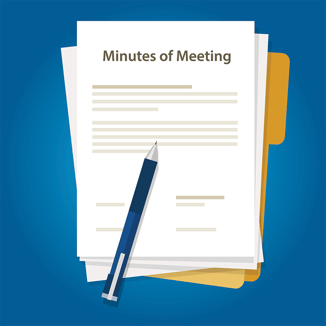 I am very fortunate to have the opportunity to work with exceptional organizations and assist them in managing one of their primary employee benefit packages: their retirement savings. I work with committee members who are focused on improving their retirement plans and helping their employees develop a more secure retirement future. We educate clients on the importance of good process in making decisions, and we then get to see the fruits of our clients’ work.
I am very fortunate to have the opportunity to work with exceptional organizations and assist them in managing one of their primary employee benefit packages: their retirement savings. I work with committee members who are focused on improving their retirement plans and helping their employees develop a more secure retirement future. We educate clients on the importance of good process in making decisions, and we then get to see the fruits of our clients’ work.
There is, however, one aspect of my job that I dread: drafting meeting minutes. For many of our clients, we draft their committee minutes for them. The minutes help to document the decisions they’ve made and develop a defined record of the decisions we’ve made together. Minutes are important. They are likely the most concrete documentation of fiduciary prudence and are reviewed by auditors, regulators, and potentially litigators, should the need arise.
While analyzing data and making decisions is fun, frequently recounting those decisions and reducing them to paper can be mind-numbing. We have done extensive training with our team internally on the importance and best practices for drafting retirement meeting minutes. I thought we might share some of those insights with you.
- Meeting minutes are not court transcripts. Who said what is not important, what was discussed and decided are the key points.
- Don’t record your meetings (if you do, destroy the tapes once the minutes have been drafted). Conversations without context never sound good, and recordings will be edited to the least flattering moments if kept.
- Keep supporting materials with the minutes. The minutes record, the decisions, and the data that was used to support the decisions are frequently included in the supporting materials (an investment report for example).
- Brevity is the soul of wit. Not even the Committee is interested in a set of minutes that extends for pages. Be thorough, but concise.
- Write with precision. Be cautious of generalities and discussions that don’t lead to a conclusion. Minutes should clearly and quickly delineate the current direction of the Committee.
- Get your minutes approved. Each meeting, the Committee should approve (or amend and approve) the meeting minutes. Allowing the Committee to weigh in on topics or decisions from their perspective is a crucial step in recording the history of the Committee.
Please note, none of the above makes drafting minutes any more enjoyable, but we do hope that the information adds some tools to use on your next set of retirement plan committee meeting minutes.
Multnomah Group is a registered investment adviser, registered with the Securities and Exchange Commission. Any information contained herein or on Multnomah Group’s website is provided for educational purposes only and does not intend to make an offer or solicitation for the sale or purchase of any specific securities, investments, or investment strategies. Investments involve risk and, unless otherwise stated, are not guaranteed. Multnomah Group does not provide legal or tax advice.
Any views expressed herein are those of the author(s) and not necessarily those of Multnomah Group or Multnomah Group’s clients.

